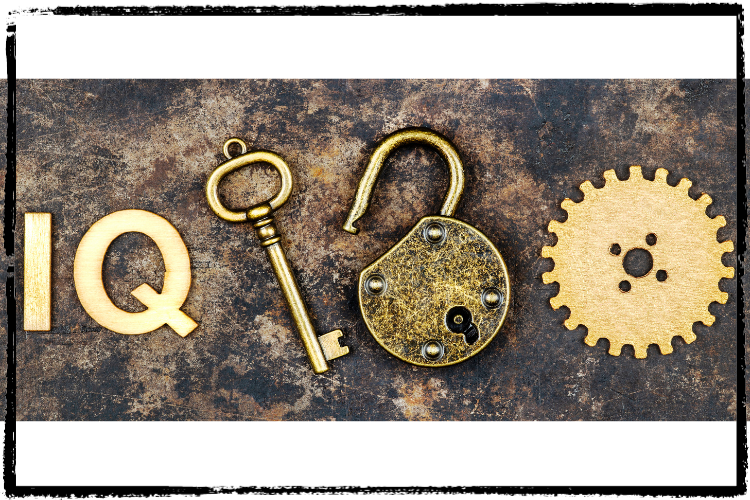By Jonny Thomson, Big Think
IQ isn't complicated, but it is misused and misunderstood
Long ago, when the rocks were young and the winds were new, the Nightingale, Peacock, and Falcon gathered together to decide which one was best.
“Let us sing a beautiful song,” the Nightingale said, and surprise, surprise, the Nightingale won.
“Let us flaunt our beautiful feathers,” the Peacock said, and surprise, surprise, the Peacock won.
“Let us fly, as fast as we can,” the Falcon said, and surprise, surprise, the Falcon won.
“So, which of you is best?” the weary Owl sighed, and no one could tell him who.
Intelligence tests
At the turn of the 20th century, people were falling over themselves trying to make the test to objectively measure intelligence. It was based on the common assumption that all kinds of intelligence — verbal reasoning, spatial awareness, memory, and so on — were simply manifestations of some central, basic general intelligence. The first test to measure this general intelligence was well-intentioned. It originated in France and was designed to identify which children would need extra help at school. This test, known as the Binet-Simon test, eventually became the model on which all IQ tests today are based.

The test presents a series of questions, each scripted to test an aspect of this general intelligence. The final score is then divided by age and multiplied by 100 to give a “percentile.”
Soon, ill effects resulted. Children as young as three are told they are of below-average intelligence based on a century-old test. Schools, employers and entire industries have been known to disqualify a candidate based on their IQ. Racists use IQ as an “objective” measure of racial superiority. Germany in the 30s used versions of these tests to forcibly sterilize or murder children.
In 1927, the U.S. Supreme Court voted 8-1 in Buck v. Bell to allow states the right to sterilize those deemed “mentally deficient” by these tests. Justice Oliver Wendell Holmes infamously wrote, “Three generations of imbeciles are enough.” It’s thought that roughly 70,000 people were victims of this ruling.
Further, IQ tests added completely perjorative, stigmatizing language to our lexicon. "Idiots," "imbeciles" and "morons" were clinical terms.
What’s IQ good for?
With what we know today, how far can we trust IQ? Reputable psychologists openly admit that IQ is not a complete measure of overall intelligence. It measures “general mental ability” also known by the variable g. An example of g is pattern recognition. Other tests investigate additional cognitive aspects, like memory, verbal reasoning and mathematical ability, but to measure g, an IQ test is the best tool.

There seems to be some evidence pointing toward a correlation between a person's g and their overall academic and professional success. Personality traits, such as agreeableness, conscientiousness, trust and generosity also feature in indicating future success, but according to one study, IQ matters a bit more.
There’s also a practical aspect to IQ. In a world where large organizations from the military to multinational corporations insist on some kind of psychometric testing, IQ tests are the best available.
Not fit for purpose
However, there are two major problems with IQ. The first stems from those who misunderstand what it’s trying to measure. IQ measures your test score against the averages of everyone else taking the test. Therefore, it’s about relative intelligence. It doesn't represent raw “brain power.”
Worse, some people equate IQ with worth. Employers, especially, might disregard a person based on a low IQ score. Doing so fails to appreciate the many employees who offer skills and abilities beyond the scope of IQ tests, such as those with personality factors mentioned earlier. The correlation between IQ and success statistically is small, and additional factors cloud the issue, according to one meta-analysis. So, the data we have — the data used to label a person for life — are desperately weak and inconclusive.
The second problem is that IQ is far too narrow a metric to so dominate the psychometric landscape. It represents only one type of intelligence. Even the ancient Greeks knew there were different types of intelligence. For example, there was techne (vocational skills), episteme (general knowledge), phronesis (practical wisdom) or nous (a rational intuition). In an interview for Big Think, the psychologist Howard Gardener identified eight intelligence types, and “IQ tests and other kinds of standardized tests valorize” only two of them.

Best bird competition
Is IQ BS? Well, that's complicated. IQ is a test, designed to gauge a specific type of intelligence which some argue on weak data is a good indicator of lifetime success. It ranks people against each other when no other information, such as examinations or qualifications, can meaningfully help in that ranking.
Headlines like “Ways to improve your IQ!” reveal what IQ is — an examination. Like any exam, you can train for it. The fact that you can improve your IQ reveals a still more fundamental point: IQ is not a measure of who you are. It isn’t something structural to your being, unchangeable and predetermined.
Human society is diverse. Each of us is better and worse at various aspects of life. When lauding people with a "high IQ" score, we miss out on the benefits supplied by so many others who are beyond the boundaries of IQ.
Yes, if you want a sweet singing bird, acquire a nightingale. If you desire a beautiful bird, hire a Peacock. If you want a fast flyer, get a Falcon. Yet, as wise Owl knows, there is no such thing as a Best Bird Competition.

Jonny Thomson teaches philosophy in Oxford in the UK and runs the popular Instagram page, Mini Philosophy, in which he introduces followers to philosophical ideas through bite-size, thought-provoking posts. His first book is Mini Philosophy: A Small Book of Big Ideas.


